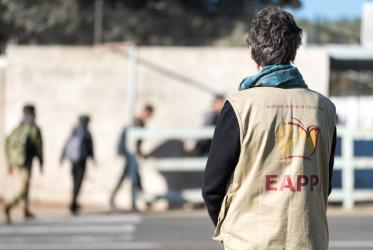The World Council of Churches – Ecumenical Accompaniment Programme in Palestine and Israel (WCC-EAPPI) works for just peace in the Holy Land. And as peace cannot be a one-sided process, efforts are made continuously to build partnerships along the full range of the spectrum.
“We believe the WCC-EAPPI has a role to play, not only as a protective presence, but as a bridge-builder,” reflects WCC-EAPPI international coordinator Rev. Dr Owe Boersma. “So each term, we make sure our ecumenical accompaniers (EAs) are given an opportunity not only to observe life under occupation in the Palestinian territories, but also to establish and nurture partnerships with other organizations working for justice and peace in the area.”
Israeli partners encourage EAs’ engagement for peace
Meeting with a group of EAs as part of a “mid-term orientation” programme, Amos Gvirtz, Israeli peace and human rights activist and once founder of the Israeli Committee Against Home Demolitions, reflected on what it means to be “building a nation and a home for the Jewish people”, when at the same time you are effectively destroying the homes of others in your way.
House demolitions, like other aspects of occupation, are done in the name of Israeli security, Gvirtz observed, “but who thinks of the security of the Palestinians, who have no security at all? And where does it take us, if we continue to criminalize the victims – when huge areas are declared military zones, and the small communities that exist there are suddenly made illegal?”
“You cannot believe the respect I hold for the work you are doing as EAs,” Gvirtz commented. “We know the psychology of the media. If there are casualties, they report. But if not, then not so much. So we need your work. We need you, we need you, we need you.”
Prof. As’ad Ghanem, lecturer at the Comparative Politics School of Political Sciences of the University of Haifa, reflected, “we see how the state of Israel takes more and more steps to make itself a state not for the people of Israel, but a state for the Jews of Israel.”
“Israel is 70 years old, but still in an official state of emergency,” noted Ruth Hiller, a long-standing advocate for the demilitarization of Israeli society, and the mother of four conscientious objectors who refused to serve in the Israeli military. “We are somehow inside a bubble which we refuse to pop, and we must understand that we are responsible for what is going on here.”
Being here, one of the EAs said during a moment of reflection, “seeing the Palestinians teach me life and courage, how they give us such an amazing lesson. This gives me hope… But also to see that there are people on the Israeli side, who know and dedicate their time to support the Palestinians.”
EAs offer protective presence, night as well as day, as Khan al Ahmar faces demolition threat (WCC feature of 4 October 2018)
Morning life and resilience under occupation – EAs witness checkpoints in Jerusalem and the West Bank (WCC feature of 9 October 2018)
Early morning business: EAs accompany Bedouin shepherds in Jordan Valley (WCC feature of 7 October 2018)








